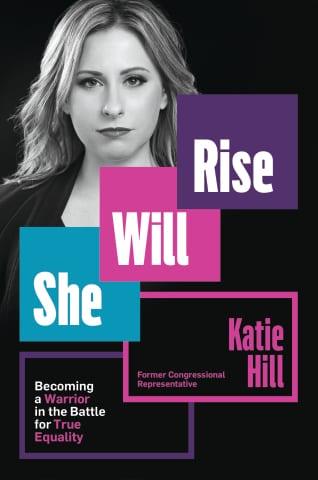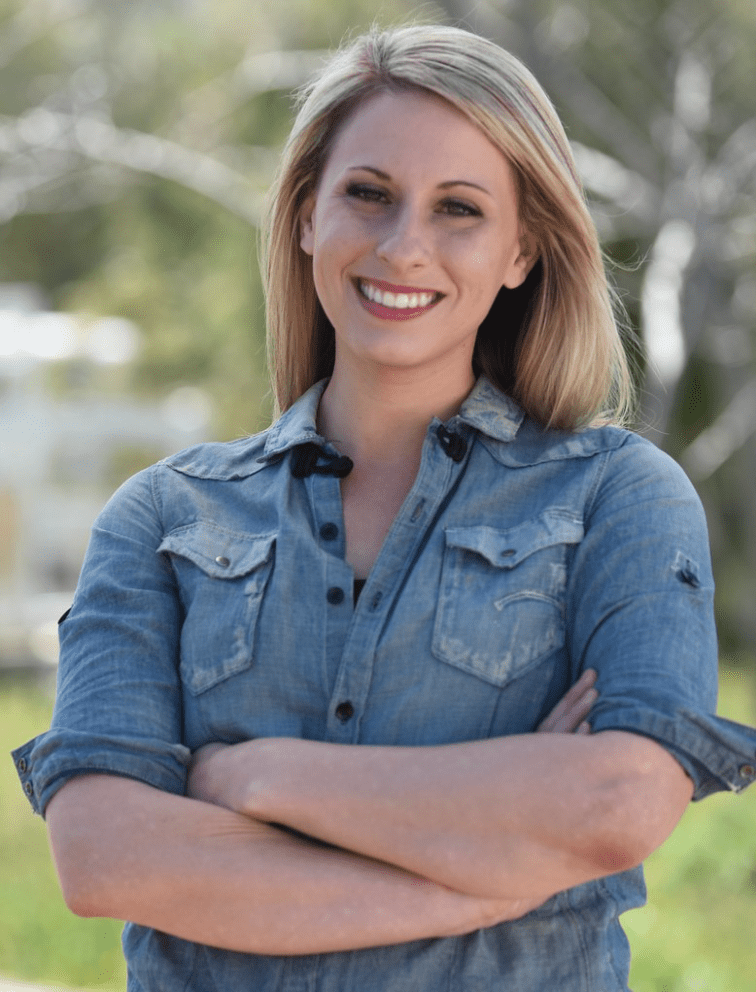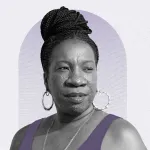In her new book, Katie Hill asks herself a question that men accused of sexual misconduct almost never ask publicly: “Did I unintentionally perpetuate any of the abusive behaviors I myself endured for so long?”
It’s been less than a year since Hill, once an upstart champion of the Democratic Party, resigned after nude photos of her appeared on the conservative website RedState. One of those photos, which Hill believes were leaked by her estranged husband, Kenny Heslep, showed her with a female campaign worker. Heslep, who Hill plans to name in a civil lawsuit to be filed later this year, denies leaking the photos and claims that his computer was hacked.
In her new book, “She Will Rise,” Hill writes that Heslep psychologically tormented her for 15 years, monitoring her every move, constantly belittling her and threatening to destroy her political career if she left him. She says that the abuse left her suicidal and questioning her sanity.
“When I finally decided to leave, my ex was regularly carrying a gun around the house throughout the day, had taken away the only gun I had access to, and was incredibly volatile,” she writes. Hill felt she had to gather her things and sneak out while he was asleep.
Hill believes Heslep made good on his promise to ruin her career, allegedly taking secret nude photos of her and then slowly leaking them, blackmailing her into leaving office. Hill’s resignation ended an ethics investigation into allegations, which also appeared in RedState, that she had a relationship with a legislative aide. Both she and the aide deny that accusation. Hill and Heslep did, however, have a relationship with her campaign worker.
A relationship with a legislative aide would have been a violation of U.S. House rules. Hill’s relationship with her campaign worker, which occurred before she took office, would not. Still, she understands power dynamics, she says. She knows the relationship was inappropriate.
“The only thing that you can do, or that I’ve figured out that you can do, is try to make amends and seek forgiveness and do something positive moving forward,” Hill told The 19th in an interview.
But Hill is quick to add that the relationship was consensual. It wasn’t the worker who made allegations against her, she points out. “I loved this woman,” she writes in the book. She offers few other details about the relationship.
“I didn’t go into that at all because I am trying to respect her decision to not want to be in the spotlight around this,” she told The 19th. “You know, she’s made it very clear that she wants to move on with her life.”
Hill casts herself as both a villain and victim in the #MeToo era. She came out as bisexual while still married to Heslep, who she first met at age 16 (he was 20 at the time). Heslep pressured her into exploring her sexuality via threesomes and throuples, nonconsensually posting pictures of her online, she says. Heslep went so far as to post photos of her on hookup websites like Cruise Ship Mingle and the subreddit “r/wouldyoufuckmywife” while she was still running for Congress, she writes.
Once he promised that he was going to take a woman as VP, It was just full of the, ‘I don’t know, I just don’t like her, she’s not likable enough.’ Or ‘she’s too ambitious.’
She contextualizes her downfall in American politics in a deep legacy of misogyny; Donald Trump ascended to the presidency in the wake of credible allegations of sexual assault. She was brought down by the suggestion that she used her influence to assert control over a campaign staffer who never made an allegation against her. The criticism came from right wing media and her abusive ex, she says.
“I was a high profile person, but it’s something that women go through every single day,” she told The 19th. “I was able to use my own life experiences and the experiences of other women to show kind of the universality and how hard it’s going to be for us to overcome all of this.”
Case in point: the prolonged and public debate over who should be Joe Biden’s female running mate. “It’s so overtly sexist to me,” Hill said of the process.
“We see it virtually every part of the way, once he promised that he was going to take a woman as VP, It was just full of the, ‘I don’t know, I just don’t like her, she’s not likable enough.’ Or ‘she’s too ambitious,’ or, you know, for Stacey Abrams, what was it? That she was too self-promotional. And Kamala didn’t apologize enough.”
Hill’s own 2018 election was historic on several fronts. She flipped a historically Republican seat in California’s 25th District blue. At 31, she was among the youngest women ever elected to Congress. She was also California’s (and one of the nation’s) first bisexual members of Congress along with Rep. Kyrsten Sinema.
But lost in her deep dive into the history of sexism (Hill gives us a primer on the women’s rights movement spanning the last 100 years), is an examination of the insidious ways biphobia torpedoed her career.
“I feel like biphobia is hard to explain to people,” she told The 19th. “I don’t know that I’ve figured out the way to kind of describe it that has been effective.” Hill says even being out on Capitol Hill, her bisexuality was often invisible or overlooked.
Hill’s experiences reflect those of many bisexual people whose relationships could be perceived as heterosexual. Research shows that while bi people make up half of all queer Americans, they report some of the highest social and health disparities and least visibility within the LGBTQ+ community.

It is a wonder, then, why in her book Hill does not pause to wade deeper into her experiences serving as one just a handful of out bi lawmakers or the biphobic scandal that unraveled her career. One reason may be that she, admittedly, wrote the book in three weeks, on the heels of multiple personal traumas — not the least of which was her brother’s drug overdose death.
Part autobiography, part history textbook and part manifesto, “She Will Rise” skates through nearly every scene it introduces, giving readers not just little insight into who Hill is at the core, but precious little narrative at all. It’s hard not to wish that Hill had opted for a less motivationally-minded second act. The book is a call-to-arms for women, but her personal recollections are by far the most inspiring, if only because Hill is living proof of her message.
In her resignation speech on the House floor last October 31, she told colleagues and the world, “I yield the balance of my time for now, but not forever.”
For now, she’s peddling her book and pushing a new political PAC, HER Time. Will she ever run again?
“I’m not going to write anything off,” she said. “I think that there’s certainly a possibility.”





